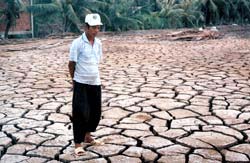Extensive drought due to El Nino phenomenon
According to the Center for Meteorological and Climate Research (Institute of Meteorology, Hydrology and Environment), the climate change situation in Vietnam takes place in the direction of the frequency and intensity of storms, heavy rain, High temperature, drought is increasing.
Right from the beginning of the year, the weather has become hot and unusually hot. Many experts forecast weather forecast: In 2007, Vietnam's climate will be dry, less rainy, the risk of drought occurs on a large scale. Scientists say the drought is expected to last at least until May this year.
Provinces in the Central Highlands, South Central Coast and South Vietnam are located near low latitudes, which will be the areas most affected by this phenomenon. The risk of drought occurs in these areas is very high. However, Vietnam's capacity to cope with natural disasters, especially coping with droughts, is very limited.

A drought in the Mekong Delta (Photo: HTV)
Mr. Nguyen Dinh Ninh - Deputy Director of Water Resources Department under the Ministry of Agriculture and Rural Development said that most drought occurred in Vietnam every year. According to statistics in the last 46 years (from 1960 to 2006), Vietnam has 34 years of drought (accounting for 74%), including 11 years of winter-spring crop, 11 years of crop and 12 years summer-autumn season. Mr. Ninh also warned, especially in recent years, the drought situation has become more intense.
According to Mr. Ninh, the cause of this situation is mainly due to the fluctuations of the weather, the climate is increasingly complicated and extreme; The development of the people 's economy, society and environment to the rapidly increasing water demand. At the same time, the regulation of Vietnam's irrigation works is still limited despite the increase in investment.
Mr. Nguyen Van Thang, Director of the Center for Meteorological and Climate Research (Institute of Meteorology, Hydrology and Environment) said that El Nino phenomenon is expected to be weakened by scientists, but now still affecting the weather of our country, making the dry season 2006 - 2007 become more severe and dry than in previous years. In March, April and May, the background temperature continued to be higher than the average of many years from 0 to 1.5 degrees Celsius.
And Dr. Nguyen Viet Thi - Head of Hydrometeorological Forecasting Division I (Central Hydrographic Forecast Center) - said that in the first months of 2007, low rainfall across the country has caused rivers to run out. . From January to March 2007, the water level in the Bac Bo River compared with the yearly losses is from 10-26%, a record low compared to hundreds of years.
The Center for Hydrological Forecasting recommends that the El Nino phenomenon has declined sharply, but the impact of this phenomenon on the global climate and the region has shown relatively obvious. That is a significant shortage of precipitation in the Western Pacific, including Vietnam.
If this phenomenon persists and lasts until April and May 2007, the possibility of summer wind will be late, leading to a shortage of rainfall at the end of the dry season and early rainy season. As forecast, water on the river will continue to dry up.
According to Dr. Nguyen Viet Thi, there are three causes of river depletion. First, because 2006 did not have many big floods, the total amount of water was lower than the average of many years. Secondly, due to the high temperature of 2007, the evaporation of water in the river system. Thirdly, the amount of water used is high (especially groundwater), so when there is no rain, low groundwater level does not provide enough for the rivers.
2007 will be the record warming year
According to Professor Phil Jones - Director of Department of Climate Research at the University of East Anglia (UK), 2007 will be a year of global warming record, leading to severe consequences for their planet me.
The warming of the Earth has caused drought in the area of African horns, melting the Arctic, leading to an increase in El Nino.This trend is causing global temperatures to rise about 1 to 2 tenths of a degree C every decade.All of these factors combined will make the global climate in 2007 warmer than in 1998 - the record hot year.
- El Nino is about to end in the Caribbean
- El Nino 2015 looks strange with the peak of 1997
- Why El Nino brought a record drought to Southeast Asia
- El Nino makes winter 2009 warmer
- El Nino can last until May 2010
- El Nino is strong record, this winter is warm
- El Nino may stop working in the middle of this year
- Can 2015 El Nino cause more natural disasters?
- 'The phenomenon of La Nina will end globally
- 'El Nino will overturn life, damage trillions of dong'
- El Nino weather phenomenon may soon appear
- Large-scale drought in South Central
 Is the magnetic North Pole shift dangerous to humanity?
Is the magnetic North Pole shift dangerous to humanity? Washington legalizes the recycling of human bodies into fertilizer
Washington legalizes the recycling of human bodies into fertilizer Lightning stone - the mysterious guest
Lightning stone - the mysterious guest Stunned by the mysterious sunset, strange appearance
Stunned by the mysterious sunset, strange appearance